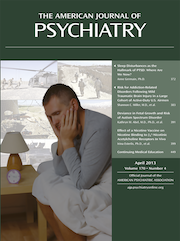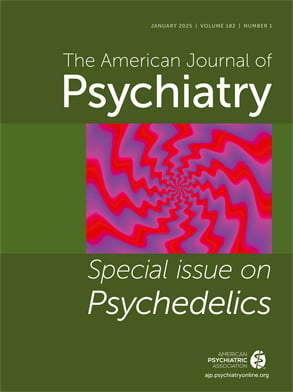T
o the Editor: In the introduction of the article by Huerta et al. in the October 2012 issue of the
Journal (
1), the authors cite several published studies indicating that the proposed DSM-5 criteria for autism spectrum disorder (ASD) would exclude approximately 10%–50% of patients currently meeting DSM-IV criteria. These patients would become ineligible for services if clinics required a rediagnosis meeting the new criteria (a common occurrence), and a similar proportion of newly diagnosed patients would be “dropped out” and denied services.
To assess this serious issue, Huerta et al. set out to determine the sensitivity and specificity of the proposed DSM-5 criteria relative to the DSM-IV criteria. They utilized three data sets including 4,453 children with a DSM-IV clinical diagnosis of pervasive developmental disorder (PDD) and 690 with non-PDD diagnoses (e.g., language disorder). They reported an overall sensitivity of 0.91 and a specificity of 0.53 for the proposed DSM-5 criteria.
The authors concluded, “Our findings indicate that the majority of children with DSM-IV PDD diagnoses would continue to be eligible for an ASD diagnosis under DSM-5,” thus implying that their data support instituting the proposed DSM-5 changes.
We respectfully disagree with their opinion regarding the usefulness of the proposed DSM-5 criteria based on their data. Abandoning criteria that have been in worldwide use for decades for new ones that may eliminate from 9% (their data) to >40% (prior reports) of previously diagnosed patients is neither scientifically nor morally justified.
Also, the specificity values they computed for the new criteria averaged only 0.53. This figure is unacceptably low by typical medical test standards.
It is also important to point out that the data set used by the authors contained only 238 case subjects with Asperger’s disorder among all 4,453 children meeting DSM-IV criteria. Thus, only a small number (0.53%) of those compared with the DSM-5 criteria were those most likely to be eliminated according to the prior studies they cited. This makes the observed specificity and sensitivity higher than they would have been if those known to be most likely to be excluded were in fact excluded before the study began.
We also wish to point out another serious unintended consequence of instituting the proposed DSM-5 criteria—the obvious problem posed to all researchers when selection criteria for subjects are changed. We have amassed large, detailed, uniformly diagnosed subject pools at great effort and expense over the past four decades. Changing diagnostic criteria would make those subject data pools incompatible and unusable for studies involving individuals diagnosed by new criteria who will be enrolled in our ongoing and future clinical and biomedical research projects.
In conclusion, the results presented by the authors do not support instituting the DSM-5 criteria and can cause harm to our patients and research projects. Furthermore, the proposed changes rest on clinical data, and any changes should be postponed until new, replicable biomedical data warrant such a major undertaking.

